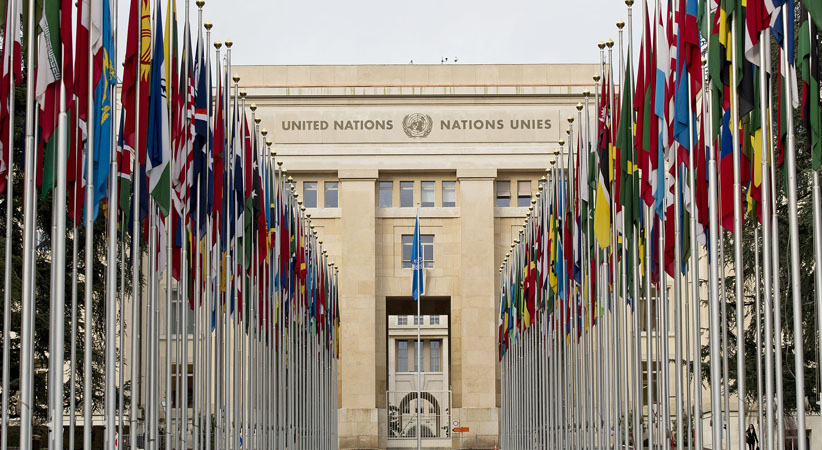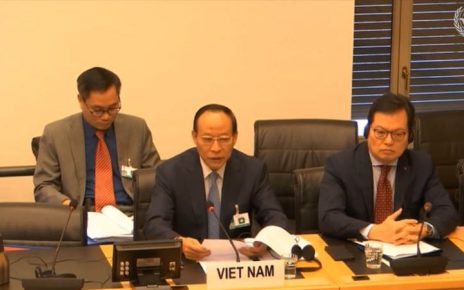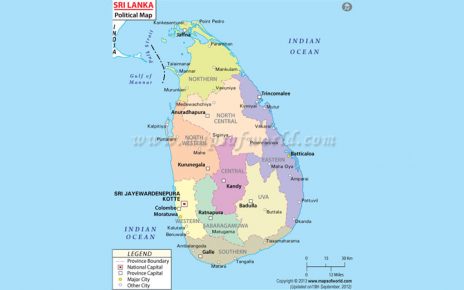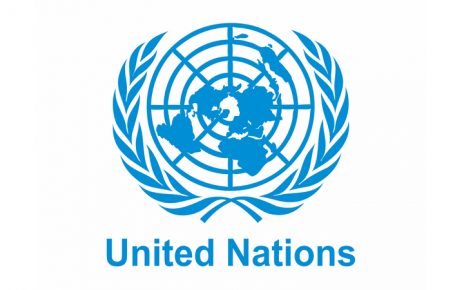The United Nations mechanisms and the Council of Europe’s Committee for the Prevention of Torture and Inhuman or Degrading Treatment or Punishment (CPT) took a number of measures against torture. This includes consideration of the periodic reports by the UN Committee Against Torture, country visit of the UN Sub-Committee Against Torture, interventions of the UN High Commissioner for Human Rights and the UN Special Procedures and interventions of the CPT.
UNCAT’s 66th session from 23 April to 17 May 2019:
On 23 April 2019, the United Nations Committee against Torture opened its sixty-sixth session, and adopted its agenda and programme of work for the session, which will run from 23 April to 17 May 2019. The Committee will review reports presented by the Democratic Republic of the Congo, Mexico, Germany, South Africa, Benin and the United Kingdom. During the session, the Committee would consider 12 individual complaints and eight discontinuances, consider the reports on reprisals and its annual report, hold its second meeting with the United Nations Working Group on arbitrary detention, among others.[1]
On 25 April 2019, the Committee concluded its consideration of the second periodic report of the Democratic Republic of the Congo submitted under the optional reporting procedure (CAT/C/COD/2).[2]
These six States under review are among the 166 States parties to the Convention against Torture and Other Cruel, Inhuman or Degrading Treatment or Punishment, and are therefore required to undergo regular reviews on how they are implementing the Convention and the Committee’s previous recommendations. The Committee, which comprises of 10 members who are independent human rights experts, will publish its findings on the respective States on 17 May 2019.[3]
UN Subcommittee on Torture
I. Subcommittee concludes maiden visit to Sri Lanka
From 2 to 12 April 2019, the United Nations Subcommittee on Prevention of Torture completed its first visit to Sri Lanka, where it examined the treatment of people deprived of their liberty and the safeguards in place for their protection against torture and ill-treatment. The four-member delegation received good cooperation during the 10-day visit, having access to all places of detention, getting all relevant information and performing confidential interviews. The delegation held meetings with the Government representatives, Sri Lanka’s Human Rights Commission and civil society representatives. The Subcommittee will submit its confidential report to the Government of Sri Lanka, containing its observations and recommendations arising from the visit.[4]
Interventions by UN Experts
II. UN High Commissioner for Human Rights voices alarm at Bahrain decision to strip 138 of nationality
On 18 April 2019, UN High Commissioner for Human Rights Michelle Bachelet expressed alarm at Bahrain’s decision to revoke the nationalities of 138 people convicted in a mass trial on terrorism charges. On 16 April 2019, a Bahraini court handed 139 men – many of them tried in absentia – to prison terms of three years to life imprisonment. It stripped all but one of them of their nationality. The UN human rights office said it had received information that 17 of those convicted were minors between the ages of 15 and 17. The UN High Commissioner for Human Rights said that the convictions give rise to serious concerns about the application of the law, particularly through a mass trial that reportedly lacked the procedural safeguards necessary to ensure a fair trial.[5]
She also expressed concern at reports of torture or other ill-treatment of some of those convicted, and urged Bahrain authorities to take ‘immediate steps’ to prevent such violations and to ensure that allegations of torture are fully investigated and perpetrators brought to justice. According to the UN human rights office, around 980 people have been stripped of their Bahraini nationality since 2012 so far.[6]
III. UN report says Afghanistan witnessed progress in torture eradication
In its report on the treatment of conflict-related detainees in Afghanistan, published on 17 April 2019, the United Nations documented an encouraging reduction in the number of cases of torture since 2016 but noted that its ongoing concern at the high number of detainees who continue to report torture and ill-treatment. The joint report by the UN Assistance Mission in Afghanistan (UNAMA) and the UN Human Rights Office, issued on the first anniversary of Afghanistan’s accession to the Convention Against Torture’s Optional Protocol, revealed that nearly a third of conflict-related detainees interviewed provided credible and reliable accounts of having been subject to torture or ill-treatment. The report is based on interviews with 618 detainees held in 77 facilities in 28 provinces across the country between 1 January 2017 and 31 December 2018. According to the report, the most common form of torture and ill-treatment reported was beatings and the vast majority of detainees said they had been tortured or ill-treated to force them to confess and that the treatment stopped once they did so.[7]
The report acknowledged progress made by the Government in implementing Afghanistan’s National Plan on the Elimination of Torture, and highlighted that this enforcement has had tangible results, with a reduction in torture or ill-treatment of conflict-related detainees across different security entities in the country. The report also highlighted instances of unlawful and arbitrary detention, including following mass arrests. The report further raised concern about poor conditions of detention, including overcrowding, inadequate lighting, the use of solitary confinement as the sole disciplinary measure and restrictions on family visits and access to lawyers.[8]
IV. Israel urged to protect Issa Amro and other HRDs
On 10 April 2019, two UN human rights experts urged Israel to fully honour and implement the rights and obligations contained in the UN’s Declaration on human rights defenders, and in particular end the use of criminal, legal and security tools to obstruct the legitimate work of human rights defenders. The statement was made after the latest hearing on 7 April in the case of Issa Amro, a human rights defender and founder of Youth Against Settlements, a Hebron-based group which seeks to end settlement expansion through non-violent civil resistance. The case of Issa Amro is emblematic of the sophisticated array of obstacles faced by Palestinian human rights defenders who engage in non-violent activities. Mr. Amro was first put on trial in an Israeli military court in 2016 on 18 charges dating back to 2010, including incitement, entering a closed military zone, and participating in a march without a permit. He had been taking part in a peaceful protest calling for the re-opening of Shuhada Street, the former commercial centre of Hebron. The two UN experts, along with other human rights experts, have sent several letters to Israel seeking clarification about Issa Amro’s case.[9]
V. Special Rapporteur on Torture says expelling Julian Assange poses threats to his human rights
On 5 April 2019, the UN Special Rapporteur on Torture Nils Melzer was alarmed by reports that Julian Assange may be expelled imminently from the Embassy of Ecuador in London, saying he intended to personally investigate the case. The Special Rapporteur feared that expelling Assange could expose him to a real risk of serious violations of his human rights, including his freedom of expression, his right to a fair trial and the prohibition of cruel, inhuman or degrading treatment or punishment. He urged the Government of Ecuador to abstain from expelling Assange from its Embassy in London.[10] However, on 11 April 2019, Assange was arrested by British Police after Ecuador withdrew his asylum and invited authorities into the embassy, citing Wikileaks founder’s bad behaviour.[11]
VI. UN rights experts dismayed at India’s continued forced deportation of Rohingyas
On 2 April 2019, a group of five United Nations human rights experts condemned the Indian Government’s decision to deport three more Rohingya to Myanmar and urged the authorities to stop such forced deportations which are prohibited under international law. The three Rohingyas deported, a father and his children, had been imprisoned since 2013, on charges related to lack of documentation. Earlier on 3 January 2019, India separated and forcibly returned five other members of their family to Myanmar.[12]
The experts expressed their dismay at the decision of the Indian Government to continue forced returns of Rohingya to Myanmar, where they face high risk of attacks, reprisals and other forms of persecution because of their ethnic and religious identity. Under international law, the principle of non-refoulement prohibits States from forcing individuals to return to countries when there are substantial grounds for believing that they would be at risk of persecution, torture, ill-treatment or other serious human rights violations.[13]
They also said that the systemic use of indefinite detention of Rohingya in India, which is indicative of the unacceptable conditions of discrimination and intolerance they face in the country where they have sought refuge, is a matter of concern.[14]
VII. UN High Commissioner urged Brunei to halt entry into force of draconian revised Penal Code
On 1 April 2019, UN High Commissioner for Human Rights, Michelle Bachelet urged the Government of Brunei to halt the entry into force of the revised Penal Code, terming it as draconian. The Penal Code, if implemented in its current form, would enshrine in legislation cruel and inhuman punishments that seriously breach international human rights law, including death by stoning. Brunei currently retains the death penalty in law but the country has been abolitionist in practice, with the last execution carried out in 1957.[15]
The revisions, due to enter into force on 3 April 2019, stipulate the death penalty for offences such as rape, adultery, sodomy, extramarital sexual relations for Muslims, robbery, and insult or defamation of the Prophet Mohammad, among others. It introduces public flogging as a punishment for abortion, and amputation for theft. It also criminalises exposing Muslim children to the beliefs and practices of any religion other than Islam. The High Commissioner said the move would mark a serious setback for human rights protections for the people of Brunei and the revised penal code may also encourage violence and discrimination against women, on the basis of sexual orientation, and against religious minorities in Brunei.[16]
EU’s action against torture
The Council of Europe’s Committee for the Prevention of Torture and Inhuman or Degrading Treatment or Punishment (CPT) continued with its efforts for prevention of torture.
I. CPT’s annual report urges police to improve interviewing practices to prevent ill-treatment
In its annual report 2018, published on 26 April 2019, the CPT stressed the need for police forces to improve the way suspects are interviewed when carrying out criminal investigations. The report indicated that in some countries police interviewing is still aimed at obtaining confessions, thus increasing the risk of ill-treatment, whereas it should be focused on obtaining accurate and reliable information about matters under investigation. The CPT underlined that the infliction of ill-treatment during police interviews remains a very serious problem in a significant number of countries. According to the report, within the last ten years, in almost one third of Council of Europe member states the Committee received allegations of police ill-treatment that could be qualified as torture. During 2018, the CPT organised 18 visits to member states carried out to examine specific issues, which included eight regular visits and ten ad hoc visits. In 2020, the Committee will carry out regular visits to Azerbaijan, Finland, Germany, Republic of Moldova, Monaco, Serbia, Spain and Sweden.[17]
II. CPT publishes report on its visit to Andorra
On 16 April 2019, the Council of Europe’s Committee for the Prevention of Torture and Inhuman or Degrading Treatment or Punishment (CPT) published a report on its 2018 visit to Andorra, together with the response of the Andorran authorities. During the visit (its fourth visit) from 29 January to 2 February 2018, the CPT was able to certify that most of the recommendations it had made following the previous visit in 2011 had been implemented. The delegation found no indications of ill-treatment by the police and reported that all safeguards against ill-treatment (the rights to notify a close relative of one’s situation, to have access to a lawyer and a doctor as well as to be informed of one’s rights) were in operation. In La Comella, the country’s only prison, the delegation received no allegations of physical ill-treatment by prison staff, and relations between staff and detainees were generally serene.[18]
III. Periodic visit to Denmark
From 3 to 12 April 2019, a delegation of the CPT carried out a periodic visit to Denmark to review the measures taken by Danish authorities in response to the recommendations made by the Committee after its previous visit in 2014. It was the Committee’s sixth periodic visit to this country. During the visit, the Committee paid particular attention to the legal safeguards against police ill-treatment as well as to the situation in prisons and establishments for detained migrants, notably in respect of treatment, material conditions and health care. In addition, the delegation visited for the first time the new Secure Department of Slagelse Psychiatric Hospital. It also paid a targeted visit to the hospital’s two intensive civil psychiatric wards in order to examine the legal procedures and safeguards in the context of involuntary hospitalisation. At the end of the visit, the delegation presented its preliminary observations to the Danish authorities.[19]
IV. Ad hoc visit to Ukraine
From 2 to 11 April 2019, a delegation of the CPT carried out an ad hoc visit to Ukraine to examine the treatment of residents of Psycho-neurological Institutions (Internats) and, to assess the progress made as regards the implementation of previous CPT’s recommendations. The delegation visited the “Internat” in Viktorivka (Cherkasy Region) and two “Internats” in Odesa Region, in Velykorybalske and Baraboi. In the course of the visit, the delegation had meetings and consultations officials including staff of the National Preventive Mechanism (NPM) Department. At the end of the visit, the delegation presented its preliminary observations to the Ukrainian authorities.[20]
V. Periodic visit to Greece
From 28 March to 9 April 2019, a delegation of the CPT carried out a periodic visit to Greece to review the progress in the implementation of the Committee’s recommendations since its previous visits in 2013 and 2015 in relation to prison matters, notably in respect of overcrowding, inter-prisoner violence, staffing levels, material conditions and health care. Particular attention was also paid to the treatment and conditions of detention of persons deprived of their liberty by the police. Further, the CPT delegation examined the transport of prisoners around the country and the situation of prisoners held in transfer establishments managed by the Hellenic Police. It also looked into the way in which investigations into allegations of ill-treatment by police officers are carried out. At the end of the visit, the delegation presented its preliminary observations to the Greek authorities.
Endnotes:
[1]. Committee against Torture opens its sixty-sixth session, OHCHR, 23 April 2019, https://www.ohchr.org/EN/NewsEvents/Pages/DisplayNews.aspx?NewsID=24506&LangID=E
[2]. Committee against Torture examines the situation in the Democratic Republic of the Congo, OHCHR 24 April 2019, https://www.ohchr.org/EN/NewsEvents/Pages/DisplayNews.aspx?NewsID=24522&LangID=E
[3]. UN Committee Against Torture to review Benin, the Democratic Republic of the Congo, Germany, Mexico, South Africa, and the United Kingdom, OHCHR, 17 April 2019, https://www.ohchr.org/EN/NewsEvents/Pages/DisplayNews.aspx?NewsID=24499&LangID=E
[4]. UN torture prevention body concludes visit to Sri Lanka, OHCHR, 12 April 2019, https://www.ohchr.org/EN/NewsEvents/Pages/DisplayNews.aspx?NewsID=24477&LangID=E
[5]. UN human rights chief deeply concerned by mass terrorism convictions in Bahrain, OHCHR, 18 April 2019, https://www.ohchr.org/EN/NewsEvents/Pages/DisplayNews.aspx?NewsID=24502&LangID=E
[6]. UN human rights chief deeply concerned by mass terrorism convictions in Bahrain, OHCHR, 18 April 2019, https://www.ohchr.org/EN/NewsEvents/Pages/DisplayNews.aspx?NewsID=24502&LangID=E
[7]. Afghanistan: Progress in torture eradication, but a long way to go – UN report, OHCHR, 17 April 2019, https://www.ohchr.org/EN/NewsEvents/Pages/DisplayNews.aspx?NewsID=24496&LangID=E
[8]. Afghanistan: Progress in torture eradication, but a long way to go – UN report, OHCHR, 17 April 2019, https://www.ohchr.org/EN/NewsEvents/Pages/DisplayNews.aspx?NewsID=24496&LangID=E
[9]. Israel must ensure protection for Issa Amro and other human rights defenders, say UN experts, OHCHR, 10 April 2019, https://www.ohchr.org/EN/NewsEvents/Pages/DisplayNews.aspx?NewsID=24468&LangID=E
[10]. UN expert on torture alarmed at reports Assange may soon be expelled from Ecuador embassy, OHCHR, 5 April 2019, https://www.ohchr.org/EN/NewsEvents/Pages/DisplayNews.aspx?NewsID=24454&LangID=E
[11]. Police arrest Julian Assange at Ecuadorian Embassy in London, CNN, 11 April 2019, https://edition.cnn.com/2019/04/11/uk/julian-assange-arrested-gbr-intl/index.html
[12]. India: UN human rights experts condemn Rohingya deportations, OHCHR, 2 April 2019, https://www.ohchr.org/EN/NewsEvents/Pages/DisplayNews.aspx?NewsID=24437&LangID=E
[13]. India: UN human rights experts condemn Rohingya deportations, OHCHR, 2 April 2019, https://www.ohchr.org/EN/NewsEvents/Pages/DisplayNews.aspx?NewsID=24437&LangID=E
[14]. India: UN human rights experts condemn Rohingya deportations, OHCHR, 2 April 2019, https://www.ohchr.org/EN/NewsEvents/Pages/DisplayNews.aspx?NewsID=24437&LangID=E
[15]. Bachelet urges Brunei to stop entry into force of “draconian” new penal code, OHCHR, 1 April 2019, https://www.ohchr.org/EN/NewsEvents/Pages/DisplayNews.aspx?NewsID=24432&LangID=E
[16]. Bachelet urges Brunei to stop entry into force of “draconian” new penal code, OHCHR, 1 April 2019, https://www.ohchr.org/EN/NewsEvents/Pages/DisplayNews.aspx?NewsID=24432&LangID=E
[17]. Police should improve interviewing practices to prevent ill-treatment, says Council of Europe’s anti-torture committee, Council of Europe, 26 April 2019, https://www.coe.int/en/web/cpt/-/police-should-improve-interviewing-practices-to-prevent-ill-treatment-says-council-of-europe-s-anti-torture-committee
[18]. Anti-torture Committee publishes a report on Andorra, Council of Europe, 16 April 2019, https://www.coe.int/en/web/portal/-/le-comite-anti-torture-publie-un-rapport-sur-l-andorre
[19]. Council of Europe anti-torture Committee visits Denmark, Council of Europe, 18 April 2019, https://www.coe.int/en/web/cpt/-/council-of-europe-anti-torture-committee-visits-denmark
[20]. Council of Europe anti-torture Committee visits Ukraine, Council of Europe, 15 April 2019, https://www.coe.int/en/web/cpt/-/council-of-europe-anti-torture-committee-visits-ukrai-2




